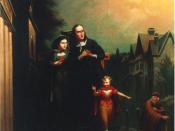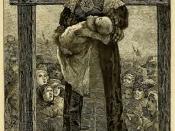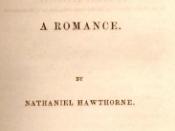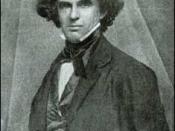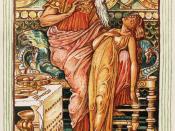Dimmesdale vs. Dimmesdale The credits say the script is "freely adapted from Nathaniel Hawthorne," and that's putting it mildly. Hawthorne managed to tell his story without a red bird, but Hollywood managed to give a canary a wonderful dye job. Hawthorne didn't contrive witch trials or an in-the-nick-of-time Indian attack, and he certainly didn't feel the need for a happy ending. Hollywood altered The Scarlet Letter's scenes and characters, and reworked the ending so substantially that any resemblance between the movie and the book is only skin-deep.
Leaving Hawthorne in the dust, Hollywood's interpretation of The Scarlet Letter portrays Dimmesdale as he emotes mightily, though he never matches the passionate oratory that supposedly drove Hester to distraction. Miserably tormented Dimmesdale, and not Hawthorne's Dimmesdale for sure, is incredibly dynamic. In the beginning of the story, Dimmesdale is described by these words; "His eloquence and religious fervor had already given earnest of high eminence in his profession."
This proves that the people of the town looked up to him because he acted very religious and he was the last person that anyone expected to sin. This is the reason that it was so hard for him to come out and tell the people the truth. He wishes to unburden himself by revealing his sin to his congregation, but by respecting Hester's wish to protect the both of them, he never quite manages this, until it is revealed in the end. Dimmesdale has been slightly changed to be victim of the inner torment of his sin not because of his cowardice, but of Hester's strength and demand that he not speak out. Torn between the desire to confess and atone for his sin and the cowardice that holds him back, Dimmesdale goes slightly mad. He takes up morbid forms of penance, fasts and scourgings, but he can neither whip nor starve the sin from his soul. In this particular portayal of the story, Dimmesdale seems to be a more compassionate character as he more outwardly shows his love for Hester and his struggle to keep their love alive. It's a perfectly good story, but it's not The Scarlet Letter.
Given that both in the movie and in the book, the character Reverend Dimmesdale, a very religious man, committed adultery. But only in the book did Dimmesdale die after finally confessing his sin on the scaffold. Dimmesdale, the weak, fallen priest, was taken from earth at the height of his pathetic ascent. It is as if God was waiting for him to make his last, valiant leap to reach Him, and then snatched him at the apex of his pathetic trajectory. Dimmesdale is redeemed, but, it would seem, conditionally. If the Puritans believed in a Purgatory, Dimmesdale would be there. Dimmesdale, both in the movie and in the book, was well known by the community and was looked up to by many religious people. But underneath his religious mask he is actually the worst sinner of them all. His sin was one of the greatest sins in a Puritan community. The sin would eat him alive from the inside out causing him to become weaker and weaker, until he could not stand it anymore. The self-prescribed torture that was also seen in the movie eventually lead to Dimmesdale's death. Where once he was an attractive man, he was now considered a pale, weak, emaciated coward who could barely walk and would have great pains, in which he would grab his chest. Dimmesdale begins the story as a handsome, religious figure in the community and slowly becomes more cowardly. He hides himself behind a mask of lies and cannot bring himself to come out from hiding. His character portrayal in the book seems as though he wants little or no association with Hester, he seems a lot more cold hearted and careless about whether the two of them eventually end up together or not.
I am openly not a fan of the Hawthorne novel. Frankly, the whole story could have been said in thirty pages as opposed to the two hundred and fifty that I dully skimmed through. I don't honestly think I'd be terribly interested in the thirty page version either, but the movie is worthy of an Oscar in my opinion. Admittedly, it didn't follow the story line exactly from the book, but if you look at the opening credits it says freely adapted. This freely adapted version was a pleasant treat after reading such a gloomy story. The opening of the movie was a much better introduction than Hawthorne ever thought about writing.
